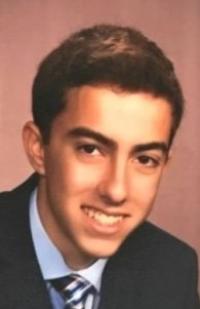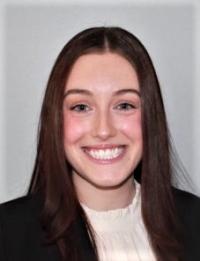Panel Discussion with Seniors who Have Found Jobs Before Graduation
(Transcribed from a live event that took place on March 22, 2023)
Written by Amy Louise, Career Services Coordinator, Dept. of Economics
Panelists:

Tom Caruso—Tom is from Connecticut, and he didn’t want to end up at the same university where all his high school buddies were going, so he applied at other schools and chose OSU. He has an uncle who helped him learn about work opportunities. His career interests lie in math and analysis, and he will be starting work at the Bank of New York in their 2-year training and development program for operations analysts.

Morgan Cocozello—Hailing from New Jersey, Morgan visited Ohio State and signed on the same day! She used LinkedIn and the company website to secure a job with Nationwide Retirement Solutions s a Financial Services Analyst.

Danielle Lutz—Danielle came down to OSU from northern Ohio to study. When it was time for her to look for work, she specifically worked with her Buckeye Undergraduate Consulting Club members and with recruiters from companies that she was interested in. Working as a business analyst in government and public relations for Deloitte is her next step.

Hunter Guo—Hunter is originally from China, where his family still resides. He started at Miami University but moved to OSU because it was a bigger and more prestigious school. Hunter was interested in having an internship that would offer him a short-term work experience before committing to a career. He found one through the Economics Career Service Office and will be a Financial Advisor in Community Marketing at Lifetime Financial after graduating.
Questions:
How did you organize your job search?
Danielle—She was very organized and started looking and preparing during the summer before her senior year. She connected with businesses via LinkedIn and started an Excel document in which she listed and kept track of her contacts. She also found examples of business case studies online and practiced them. In July and August, she was applying for jobs and going to interviews. The process took her 3-4 months.
Morgan—She had a successful internship experience at Nationwide, and this turned into a job offer. She liked the company because its corporate values aligned with hers and allowed her to follow her career interests.
Tom—Tom wanted to work at the place he had interned, but he was not accepted for a permanent position. At the beginning of his last semester, he began searching job sites and applying for openings. He was willing to consider various areas of employment and employers.
Hunter—Handshake was Hunter’s favorite job-search tool. He liked how it was centralized for thousands of employers and focused on university students. Hunter spent about a year networking and using his weekends to check on new openings and apply. He also attended a lot of in-person events to help him develop his professional interaction skills, and he used the campus career offices and their resources.
Did you have times in your job-search experience when you heard nothing in response to your applications or interviews? How did that feel, and how did you handle it?
Danielle—When she was looking for internships, networking was important, but once she contacted someone who had expressed an interest and was completely “ghosted.” That bothered her, and she thought it was very rude. Danielle found that the length of time it took to hear anything (if she ever heard anything) in response to an application was totally random. One day she had 4 back-to-back interviews for one position, and she was exhausted and stressed. It was too much! Danielle was surprised by how much work and perseverance she had to exert in her job search, and employers acted as though her time wasn’t valuable.
Hunter—Hunter found that the results of applications or interviews were “hard to peg.” The results could be surprising and not what he expected.
Tom—It was hard sometimes for Tom to understand what had “side-stepped” an application or interview. He didn’t get the job but didn’t receive any feedback as to why.
What kind of experiences and skills do you think are important to include in your resume and cover letter?
Morgan—She thinks that students often “short-change” themselves by undervaluing their experiences in school. She did a capstone project that allowed her to demonstrate many skills when she was applying for internships, and she focused on which skills she had learned and used in classes.
How much personality did you share or let your interviewers see?
Morgan—Morgan thinks that it’s a good thing to let your personality show through in an interview. She tries to relate employers’ questions to personal experiences that will express her individuality.
Did anything stupid or embarrassing happen while you were talking with an employer? How did you keep calm and manage to continue?
Tom—He was concentrating very hard on answering difficult questions well during an interview, that when the interviewer unexpectedly asked him what 15 X 15 was, Tom’s mind went completely blank, and he just stared at the man. He answered other questions after that, but he didn’t get the math problem correct.
Danielle—At an interview that included a case review, she didn’t understand all of the business terms that her interviewer was using, so he started yelling at her and berating her because she was “supposed to know these things” even though her major was economics, and math-based, rather than business-based. It was very upsetting, and she decided that she didn’t want to work there.
How did you prepare for the interview that got you this job?
Hunter—He worked on perfecting his elevator speech so that he could deliver it naturally and could easily highlight the things that would make him stand out as a candidate. Hunter also referred to the skills and experiences that he had mentioned in his resume when answering questions so that he reinforced the interviewers’ familiarity with what he could bring to the job.
Morgan—Morgan prepared answers to behavioral questions based on skills, projects, and experiences that she had had as a student. That way she could give examples of things she had learned in school that she could not list on her resume.
Tom—He prepared “set” answers to possible case scenarios and questions so that he would be ready to give an interviewer’s the requested information.
Did you do any negotiations with our employer over benefits, salary, schedule, start date, or anything else?
Tom--After had had been offered the job, he asked for relocation money. He knew he wouldn’t lose anything by inquiring, and he actually gained a lot.
Were you offered more than one job? How did you make the decision to go with the company you have a job with now?
Danielle-She took time to evaluate the opportunity costs involved in her decision making. For example, if she decided to take the job with higher pay rather than the job with more options for professional development, how would that affect her career in the future, and would she be better off?
What advice or tips do you have for graduates looking for a job?
*Get internships because they can turn into full-time jobs with higher starting salaries.
*Apply everywhere you think you would like to work. You never know what will happen.
*Talk to as many people as you can about your interests, their work, their companies, and you career goals.
*Take initiative. If you haven’t heard back from someone, follow up with that person.
*Show confidence.
*Reach out to people who may be able to help you.
*Don’t get down about how long it takes or not getting an offer.
*Be flexible when something throws off your job search but keep at it.
*Don’t give up!
